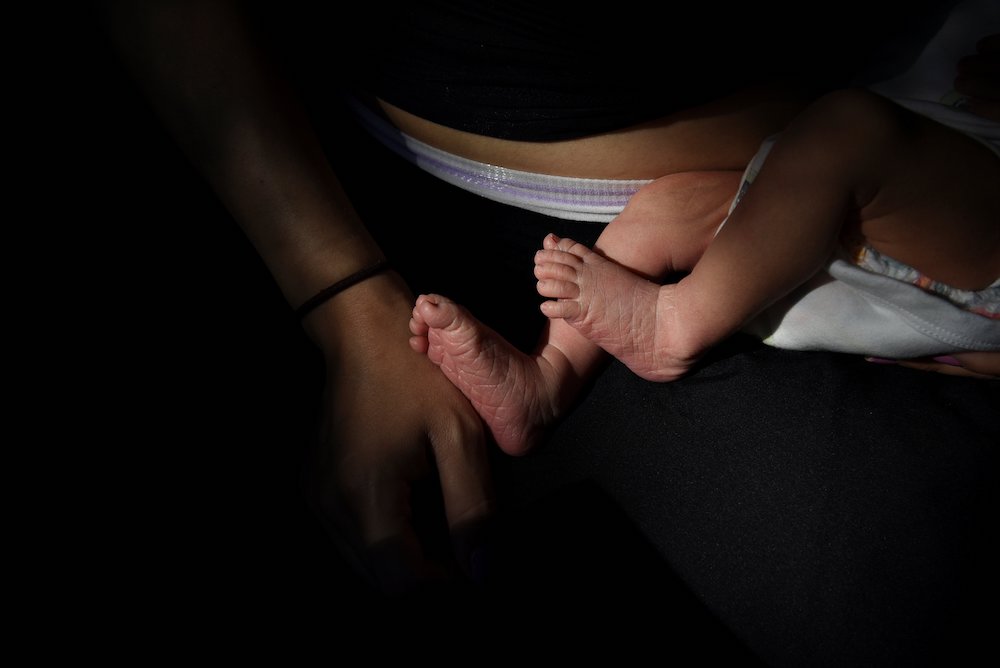
A mother in Fort Worth, Texas, breastfeeds her newborn son April 10, 2020. (CNS/Reuters/Callaghan O'Hare)
During the U.S. bishops' meeting in November, buried in the middle of discussions about pro-life politics, plans for a eucharistic revival and the church's new penal canon law, there was a presentation about the Walking with Moms in Need initiative, which encourages parishes to help pregnant and parenting moms.
The initiative does not try to replicate the work of pregnancy help centers, as Archbishop Joseph Naumann of Kansas City, Kansas, chair of the bishops' Committee on Pro-Life Activities, said in the presentation last month. (Nor does it advocate for government to do more to help needy families — something I wish it did.)
Rather it provides "educational, pastoral and action-oriented resources" to parishes so they can "facilitate the accompaniment of mothers in need at the parish level," according to the initiative's website.
There is certainly nothing wrong with promoting a more open, less judgmental attitude toward women with unplanned pregnancies, as Naumann encouraged — especially as the U.S. Supreme Court decision on abortion's legality looms.
In the discussion following the presentation, however, Bishop George Thomas of Las Vegas made several seemingly innocuous comments about adoption that most contemporary adoption professionals and many in the adoption community would find problematic.
Thomas was sharing about a program in his diocese that promotes a "vigorous adoption option approach," especially among Catholic politicians. In describing adoption, he cited a family in which the parents reportedly said, "We have five children. Two are adopted. We can't remember which two."
Thomas called this "a wonderful way to see that we can receive little children into loving families."
I'm sure this humorous anecdote is meant to affirm the strength of an adoptive parent's love — something I can testify about firsthand as an adoptive mother. But comments that overromanticize adoption do not reflect everyone's experience of adoption and seem to downplay the trauma adoption can have on adoptees.
The reality of adoption is that it always begins with loss — and that loss can haunt adoptees throughout their lives.
Advertisement
It is a traumatic loss not to be raised by one's birth parents, or to never even know who they and other birth relatives are. There is a reason genealogy is fascinating to so many people, and why the PBS series, "Finding Your Roots" is such compelling drama. That sense of belonging is robbed from adoptees, and while some find it after long searches, others never do.
For transracial or transcultural adoptees, their losses can also include loss of culture, knowledge about their ethnic or racial heritage, and their first language.
I write about this as both an adoptive parent and as a birth parent who placed a child for adoption when I was younger. Certainly I am beyond grateful that my husband and I were able to create our family through adoption. And I believe that the choice to place my child with an adopted family was the best one, given the circumstances, for me and for him at that time. But it was my choice, not his.
The most impacted person in the "adoption triangle" is the adoptee, and I have learned much from adult adoptees, who in the past generation have been vocal about speaking out about their experiences — ones that don't match the photos of beaming adoptive parents with their babies celebrating Adoption Awareness Month each November.
When I tweeted about the bishops' overromanticized adoption language during the Walking with Moms in Need presentation, another person responded that all of the adoptees she knew were "glad to be alive." This "rescued/rescuer" model is especially dangerous for adoptees, who often internalize the narrative that they should be grateful for their existence, even though they may be feeling so much pain.
Adoptees are four times more likely to attempt suicide, and many can struggle with depression and feelings of not belonging, especially for adoptees of color who are raised in all-white families and in non-diverse communities. Therapists and adoption professionals are well versed in these realities, as are many adoptive parents.
My point is not that adoption is terrible and should be abolished — although some do argue that — but rather that adoption is complex and complicated and traumatic. There is much joy in adoptive families, but adoption is a wound and a continuing struggle for many adoptees. It also can haunt birth families, especially if the mother was coerced, although that was not my experience.
We all need to listen to adoptees themselves and birth families, not just to adoptive parents who tend to have more power and thus often control the narrative about adoption in our culture.
Adoption can be the best choice in some very difficult circumstances, but we also should be asking hard questions about the kind of societies that put women and their children in those circumstances — whether it is poverty, sexual violence, lack of access to birth control or an overall lack of support systems for children and families.
If the bishops or other pro-life Catholics want to promote adoption as an alternative to abortion, they should educate themselves about the reality of adoption and avoid painting adoption in "rainbows and sunshine" language.
They owe that to the very people whose lives they're trying to save.








